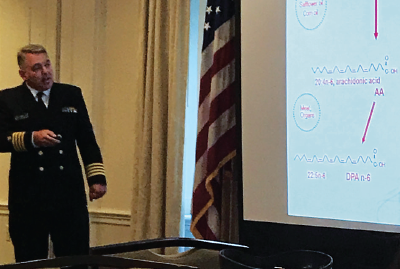When considering treatments for psychiatric disorders, clinicians are used to weighing the latest evidence on medication and psychotherapy before making treatment recommendations. There is growing recognition that diet should be a part of these conversations as well, said a panel at a symposium hosted by the Washington Psychiatric Society.
“The tide has turned in nutritional psychiatry,” said Drew Ramsey, M.D., founder of the Brain Food Clinic in New York City and chair of APA’s Council on Communications. “We have good data that show a healthy diet can contribute to a healthy mind. If you are not discussing diet with a patient, you are not practicing evidence-based psychiatry.”
Fellow presenter Robert Hedaya, M.D., a clinical professor of psychiatry at Georgetown University School of Medicine, described how he first became interested in how diet and nutrition can affect treatment outcomes in patients with psychiatric disorders decades ago. In the late-1980s, Hedaya was treating a patient with panic disorder who had failed to respond to multiple treatments, including newly approved fluoxetine (Prozac), which had been much touted. He felt the treatment options were beginning to run out, he explained.
But one day, while looking over his patient’s blood test, he saw that her MCV (mean corpuscular volume) reading was high, suggesting that the red blood cells were larger than normal. After scanning other lab values, it dawned on him that his patient might be deficient in vitamin B12—a key nutrient in the production of neurotransmitters.
Sure enough, one injection of B12 later, and the medication started to have an effect.
This is not to say that the right vitamin supplement can be a panacea for mental illness, noted fellow symposium psychiatrist Capt. Joseph Hibbeln of the United States Public Health Service. But he said that diet is just as important in psychiatry as it is in cardiology or gastroenterology.
He recalled one of his first lessons about the brain in medical school—that this organ is primarily fat and water. “And the fats that are critical for brain function are available only from the diet,” he said.
Hibbeln was referring to omega-3 and omega-6 fatty acids (named for where a double-bonded carbon is located in the molecular chain), such as the omega-3 docosahexaenoic acid (DHA), a key structural component of neural synapses.
According to Hibbeln, while both omega-6 and omega-3 acids are important for brain function, humans need to maintain the right balance between the two as omega-6 fatty acids tend to be pro-inflammatory (he said that an omega-6/omega-3 ratio of 4:1 is considered a good standard). However, the high consumption of the omega-6 rich soybean oil in modern diets results in many individuals having ratios of 16:1 or even higher; this can cause cellular damage.
Given the growing recognition of the role inflammation may play in mental health, Hibbeln said it makes sense that lowering the ratio of omega-6 to omega-3—which can be done through dietary changes or taking supplements—might have therapeutic benefit.
Hibbeln pointed to a meta-analysis he helped conduct last year that found that people who took omega-3 supplements as part of their treatment showed greater improvements in depressive symptoms compared with patients taking placebo. Depression has been the most extensively studied psychiatric disorder in relation to omega-3 interventions, but Hibbeln noted that there are promising data for other disorders such as schizophrenia.
Ramsey added, “Nutrition does not change the action of a receptor; rather, it changes the milieu in which that receptor lives and works alongside medications.”
In terms of prescribing practices, Ramsey said nutrient-dense foods like oysters, almonds, and kale make good brain foods, and physicians can encourage dietary changes by having patients take photos of their food or keep a food diary, which the patient and doctor can review.
Ramsey noted that if nothing else, talking about food is a great way to get to know a patient and build a relationship. But he believes there is much more benefit to be had. ■

